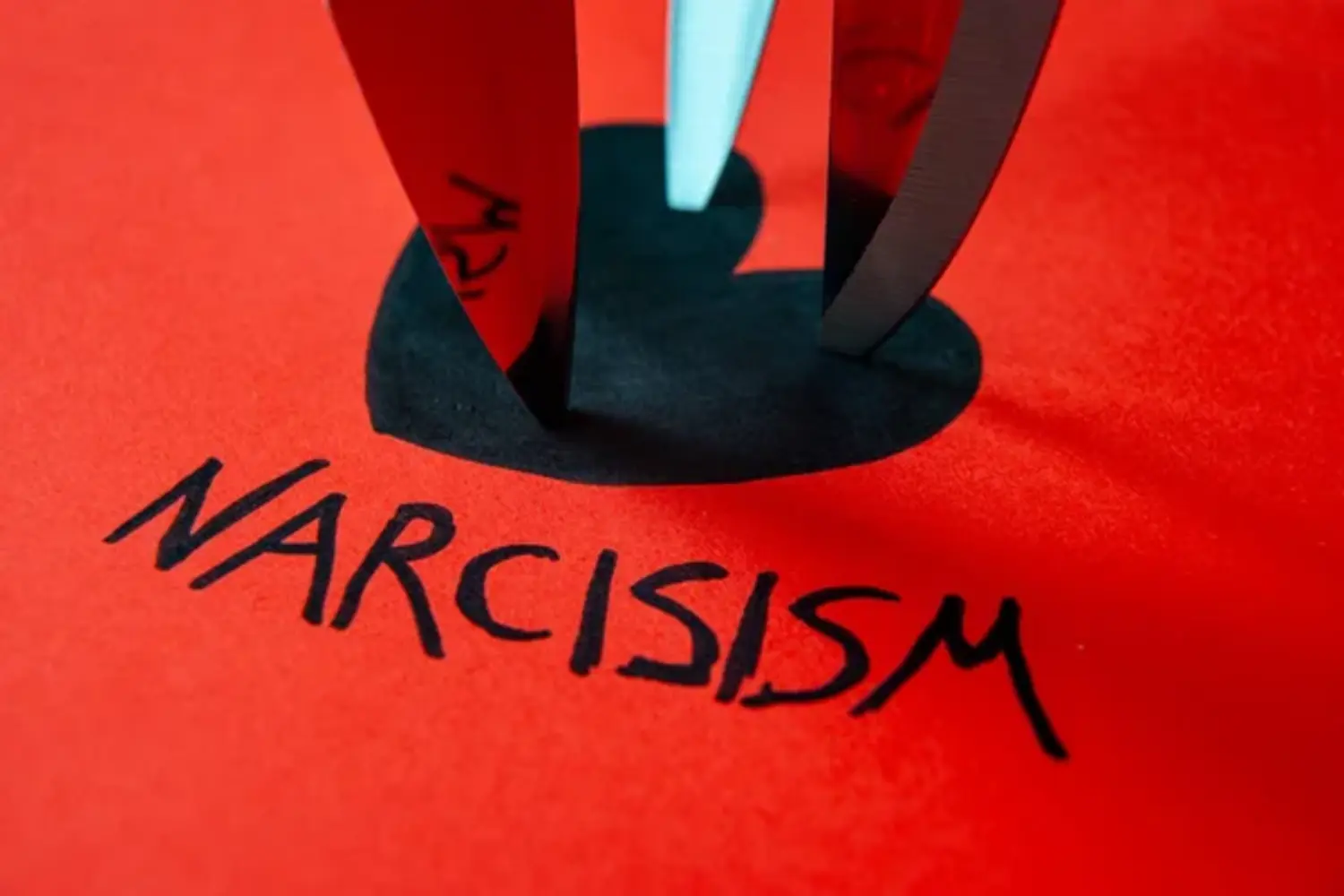When it comes to relationships, we all have experienced a difficult person at some point in our lives. These difficult people can often belong to the category of narcissists, who falsely portray an exaggerated sense of their own importance and achievements.
If you’re starting to notice certain red flags in your new romantic partner or close friend and think they may be a narcissist, keep an eye out for these telling signs.
Their words are often incongruent with their actions due to their lack of follow-through; they crave attention, yet they rarely acknowledge the accomplishments of others; they are prone to manipulation that satisfies only themselves; plus, they lack empathy and even blame others for their problems.
While these signs indicate a narcissistic individual, it is important to remember that not everyone who displays such behaviors is one, and more extensive research surrounding them should be taken into consideration before making any conclusions.

Signs He Is A Narcissist
Knowing the signs of narcissism can help people to identify and deal with narcissistic people in their lives.
A plethora of signs may be exhibited by a narcissist, including grandiosity, entitlement, an inability to recognize the feelings and needs of other people, an intensive focus on achieving goals, a lack of empathy, entitlement, and frequent disregard for rules.
In addition to these common traits, narcissists may also seek admiration from others; they often believe themselves to be better than those around them while expecting special treatment.
It is important to note that if someone exhibits just one or two of these traits it does not necessarily mean that they are a narcissistic person; rather it is when multiple indicators align that there is a greater potential that the individual has narcissistic tendencies.
10 Signs He Is A Narcissist
1. They Have An Exaggerated Sense Of Self-Importance And A Grandiose Sense Of Self-Esteem.
Narcissism is a psychological disorder characterized by an exaggerated sense of self-importance and a grandiose sense of self-esteem, often accompanied by a need for admiration from others.
Individuals suffering from this disorder are usually preoccupied with fantasies of unlimited success, power, brilliance, and beauty.
They may also have an inflated view of their own talents, abilities, and accomplishments while simultaneously devaluing the talents, abilities, and accomplishments of others.
People who are narcissistic are typically excessively involved in conversations about themselves and their own accomplishments even when it seems inappropriate or unnecessary.
They often seek out admiration and praise from others, but rarely give it in return. Furthermore, they can be overly sensitive to criticism while exhibiting difficulty in recognizing when they have made mistakes or done wrong.
Ultimately, these characteristics can lead the narcissist to become excessively arrogant and demanding as well as manipulative towards other people.
2. They Constantly Seek Attention And Admiration From Others.
People with narcissistic tendencies often seek constant attention and admiration from others in order to boost their own sense of self-worth.
They may go to extreme lengths to ensure that they receive the recognition and validation they desire, such as talking over other people in conversations, displaying boastful or arrogant behaviors, or even lying about accomplishments.
This need for admiration is usually accompanied by deep-seated insecurity and a lack of self-esteem.
These individuals may struggle with forming meaningful relationships due to their difficulty empathizing with or understanding the needs of others.
Narcissists also tend to be jealous, possessive, and controlling towards those close to them, as well as exhibiting a great deal of entitlement and selfishness in their interactions.

3. They Believe They Are Entitled To Special Treatment And Often Exploit Others To Get What They Want.
When a person displays narcissistic traits, they believe themselves to be exceptional, deserving of privileges and attention that surpass those of mere mortals.
They expect others to cater to their whims and fulfill their every desire, often disregarding the needs and boundaries of those around them. Their self-centeredness becomes the driving force behind their interactions, overshadowing genuine connection and empathy.
A narcissist’s exploitation of others knows no bounds. They manipulate and deceive, using charm and charisma as tools to manipulate emotions and control situations to their advantage.
Their insatiable hunger for power and control often leads them to exploit the vulnerabilities and emotions of those who care for them, leaving a trail of broken trust and shattered hearts in their wake.
It is essential to recognize the signs of a narcissistic persona: the incessant need for admiration, an inflated sense of self-importance, a lack of empathy for others, and the tendency to exploit relationships for personal gain.
Their words may drip with charisma and flattery, drawing you into their web of enchantment, but their actions often betray a deeper, self-serving agenda.
4. They Lack Empathy For Others And Are Often Insensitive To The Feelings And Needs Of Those Around Them.
Narcissism is characterized by a lack of empathy for others, indicating an inability to recognize or identify with the feelings and needs of those around them.
This can manifest as a disregard for the feelings of others or a complete absence of understanding as to how their actions may affect them.
Furthermore, narcissists often display an extreme sense of entitlement and an inflated sense of their own importance, making it difficult for them to comprehend another person’s perspective or experience.
They are often insensitive to criticism and may resort to manipulation in order to get what they want. This lack of consideration for the needs and feelings of others is one of the primary signs that someone may be suffering from Narcissistic Personality Disorder.
5. They Have A Strong Need For Control And Will Often Manipulate Situations To Maintain It.
When a person displays narcissistic traits, they harbor an intense need for control. They crave power over situations, people, and outcomes, as it feeds their sense of grandiosity and self-importance.
They maneuver and manipulate, employing tactics of gaslighting, manipulation, and coercion to bend others to their will.
A narcissist’s manipulation knows no bounds. They exploit emotions, employ guilt and shame, and create a labyrinth of confusion to ensure their control remains unchallenged.
Their charm and charisma become potent weapons, luring others into their intricate web of control and dominance.
Recognizing the signs of a narcissistic persona involves understanding their strong need for control, their relentless pursuit of power, and their willingness to manipulate situations to maintain their grasp.
They exhibit a sense of entitlement as if the world should bend to their desires and needs, often leaving a trail of broken relationships and shattered trust in their wake.

6. They Frequently Brag About Their Achievements And Abilities.
One of the telltale signs of a narcissistic personality is frequent bragging about their achievements and abilities. Narcissists tend to overstate their accomplishments, exaggerate their importance, and downplay the contributions of others.
They may also be overly competitive and constantly seek out opportunities to prove that they are superior. Narcissists also have an inflated sense of self-importance, believing that they are entitled to special treatment from those around them.
They often lack empathy and may struggle to relate to the emotions of others. Additionally, narcissists frequently expect praise or recognition for even small acts, usually expecting recognition without having done any real work.
7. They Can Be Very Charming And Charismatic, But This Is Often A Facade To Manipulate And Control Others.
Narcissism is a personality disorder characterized by an inflated sense of self-importance, a need for admiration and attention, and difficulty empathizing with others.
Narcissists often use charm and charisma to manipulate and control other people. They can be very charming and seductive in the early stages of a relationship, but once they have established dominance over their partner, they may become increasingly controlling and critical.
Narcissists also tend to devalue other people’s opinions or feelings and are often emotionally exploitative in relationships. They will blame others for their own mistakes and may even attempt to sabotage others’ success in order to maintain their superiority.
Narcissistic individuals have an excessive need for admiration and validation from those around them, yet rarely reciprocate the same level of empathy or caring towards others.

8. They Are Often Envious Of Others And Believe That They Are Superior To Those Around Them.
A person with narcissistic tendencies may often be envious of others, believing that they are superior to those around them.
They may also have an excessive need for admiration and attention, feeling entitled to special treatment or privileges and overestimating their own importance or abilities.
A narcissist may also demonstrate a lack of empathy towards others and exploit relationships for personal gain while showing little or no regard for the feelings of others.
Furthermore, they may exaggerate their achievements, have unrealistic expectations of themselves and others, and struggle with feelings of vulnerability and shame.
9. They Have Difficulty Handling Criticism Or Rejection And May Become Defensive Or Aggressive In Response.
Narcissistic people have difficulty handling criticism or rejection and may become defensive or aggressive in response. This is because they feel personally attacked as if their sense of self-worth has been challenged.
They often view criticism as an attack on their intelligence or abilities, and will often lash out in an attempt to protect their ego.
They also tend to think too highly of themselves, so any form of criticism can be seen as a direct attack and result in defensiveness or aggression.
Furthermore, narcissists often lack the empathy needed to understand the effects of their behavior on those around them, which can make them even more prone to lashing out when faced with criticism.
10. They May Struggle To Maintain Healthy Relationships Due To Their Self-Centeredness And Lack Of Empathy For Others.
A person exhibiting narcissistic tendencies may struggle to maintain healthy relationships due to their self-centeredness and lack of empathy for others.
This is evidenced by a tendency to be controlling, manipulative, and demanding in their interactions with others; an inability to understand the perspectives or feelings of other people; and a focus on their own needs above all else.
They typically present themselves as superior and often put down those around them in order to show they are better than everyone else.
Such individuals may also possess an excessive sense of entitlement, believing they are more important or worthy than others, and can demonstrate grandiose behaviors that include bragging about their wealth or accomplishments.
Furthermore, these individuals commonly display a lack of guilt when confronted with mistakes they make, instead pointing out ways in which they have been wronged by another person.
All of these signs suggest that an individual has narcissistic personality traits which can make it difficult for them to create or maintain healthy relationships with others.

Conclusion
In the complex realm of human relationships, where hearts seek connection and souls yearn for understanding, the signs of a narcissistic individual can cast a seductive but treacherous spell.
The captivating allure of their ego and self-centeredness may initially enchant, but beneath the surface lies a web of manipulation and shallow self-gratification.
Beware the mirage, dear seeker of genuine love, and choose instead the path of authenticity, empathy, and mutual respect. In nurturing relationships that value true connection and shared growth, you will find the fulfillment and happiness that narcissism can only offer as an empty illusion.

Hi, I’m Jasmine Sophie and welcome to my website!
As a marriage counsellor, I’m passionate about helping people figure out solutions to their relationship issues. While based in Austin and with most of my clients coming from the local area, I believed that there were more people out there who could benefit from my services.
That’s why I decided to set up this webiste; so that I can help even more people break through any difficulties they may be facing in their relationships. In my free time, I enjoy activities like golfing and fishing, as well as just spending time with family. It’s just another way for me to explore my creativity and use it towards helping others.
Experience:
With a wealth of experience in the realm of love and relationships, Jasmine has been transforming lives for over a decade. Her remarkable journey as a licensed psychologist and marriage and couples therapist has allowed her to witness the transformative power of love firsthand. Through her extensive work with diverse couples, she has unraveled the secrets to fostering healthy and thriving partnerships.
Expertise:
Jasmine’s expertise lies in untangling the complex web of relationship dynamics. Whether it’s reigniting the spark in long-term marriages, healing wounds from past relationships, or guiding individuals in their pursuit of true love, Jasmine possesses an unwavering commitment to helping people create fulfilling and joyful connections. Her profound insights and practical strategies have earned her accolades as a trusted authority in the love and relationship sphere.
Education:
Jasmine Sophie’s academic achievements serve as a solid foundation for her exceptional knowledge in the field. She holds a master’s degree in Psychology, specializing in marriage and family therapy. Combining her academic prowess with her empathetic nature, Jasmine seamlessly integrates evidence-based techniques and profound wisdom to empower her readers to navigate the complexities of modern relationships with grace and authenticity.
Join Jasmine Sophie on joypassiondesire.com, and embark on a transformative journey to embrace love, ignite passion, and cultivate relationships that transcend ordinary boundaries. Through her illuminating articles and expert guidance, she will empower you to create a love story that is worthy of celebration and admiration. Get ready to embark on an extraordinary adventure of love and self-discovery with Jasmine Sophie as your trusted guide.